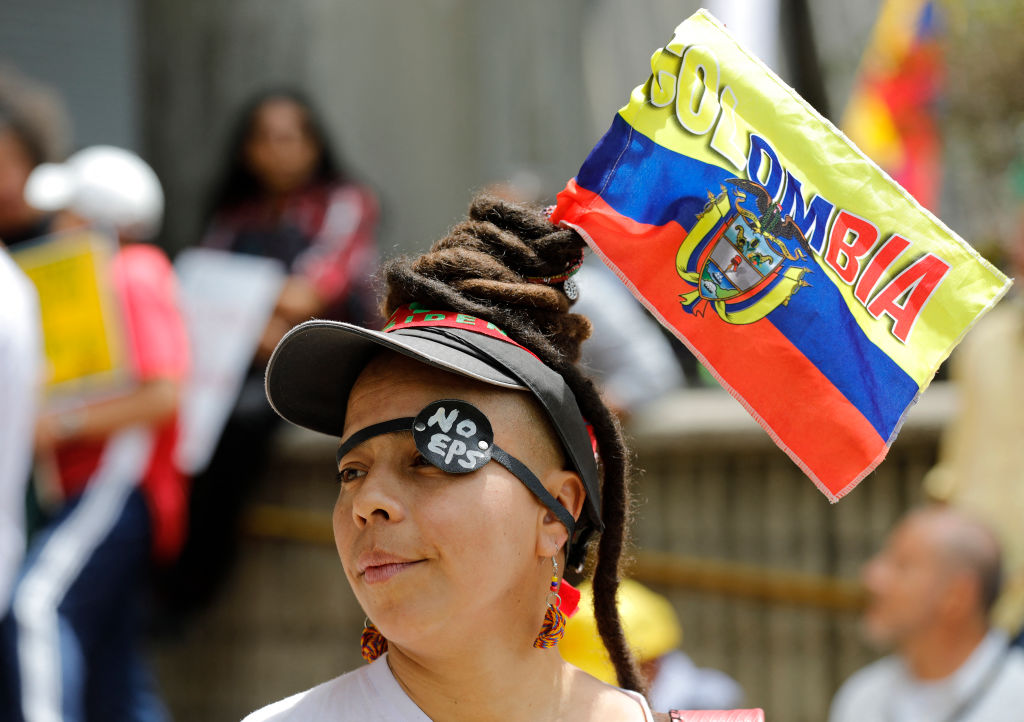Economics of Colombia and Panama-U.S. FTAs Speak for Themselves
Economics of Colombia and Panama-U.S. FTAs Speak for Themselves
"This opportunity for bipartisan collaboration is particularly true of the Colombia deal," writes AS/COA's Christopher Sabatini on The Huffington Post, "but only if the president is able to overcome the opposition of one of the most vocal and intense coalitions of anti-free trade groups ever."
In contrast to the looming political fights over spending, healthcare repeal, and immigration, free trade could be a rare case where President Barack Obama can benefit from Republican control of the House of Representatives. After all, the pending Colombia and Panama free-trade agreements (FTAs) were originally negotiated by George W. Bush's administration and then held back from being presented to Congress when the Democrats won a congressional majority.
This opportunity for bipartisan collaboration is particularly true of the Colombia deal, which has been on the table since 2006, but only if the president is able to overcome the opposition of one of the most vocal and intense coalitions of anti-free trade groups ever, comprising U.S. labor unions and human rights groups. Their collaboration on raising legitimate human and labor rights concerns in Colombia have created a ardent alliance that combines a historically grave (though much improving) human rights and labor rights situation with groups that traditionally have resisted free trade. Both groups include themselves in the Democratic Party, with one of the most outspoken and strident of the groups, the AFL-CIO, constituting an important electoral base for the President in his 2012 reelection bid. Unfortunately, advocates -- including moderate Democrats and seasoned policymakers -- of the deal have been making the wrong argument to this powerful constituency, focusing on Colombia's improvements in human rights and strategic importance rather than the very real benefits this deal will have for American workers and manufacturers.
This is not to say that maintaining the U.S.-Colombia relationship isn't important. Colombia has been a steadfast ally in its region, surrounded by the anti-institutional, anti-American Venezuelan President Hugo Chávez and the voluble (though still willing to cooperate with the U.S. on some fronts) Ecuadorian President Rafael Correa.
Colombia has also clawed its way back from the brink of becoming a failed state under siege from two narcoguerrilla groups and an array of criminal paramilitaries. At the height of the violence in the late 1990s, according to a government-created independent commission, there were 32,000 forced disappearances -- the bulk of them during the decade between the mid 1990s to the mid 2000s -- and 113,000 acts of political violence. Workers' unions bore a large part of the brunt of the violence, with 275 union members killed in 1996. Since that time, the Colombian government has made tremendous strides, reducing the murder rate from 67 per 100,000 in 2002 to 33 per 100,000 in 2008, rearranging and improving the judicial system, and launching a series of investigations into the murder of union activists and the disappearances. Correspondingly, union deaths plunged to 39 in 2010. While higher than other professions, the general decline is not surprising; according to the Colombian Attorney General in 40 percent of the cases the motives behind past crimes against union members were not linked to labor activism but to generalized violence.
Human rights groups and U.S. labor activists that have drawn a line in the sand to oppose this agreement have focused on these issues, arguing that not enough progress has been made to warrant the U.S. government approving the FTA. (Never mind the fact that the Colombian Congress has approved the agreement, as do a majority of Colombians, including some labor unions. In fact, current Vice President Angelino Garzón, a former leading union activist, has been pushing hard for the agreement.) Groups such as Latin American Working Group and U.S. labor unions, such as AFL-CIO, while conceding that progress has been made, continue to add demands -- many of them vague and immeasurable -- that range from a complete investigation of all cases of political violence dating back to 1993 to a further reduction in the murder of unionists -- though what point would be acceptable is unclear. In countering this argument, pro-FTA commentators have fallen into the trap of defending Colombian government's progress in human rights and labor rights and its importance as an ally. Pro-FTA advocates such as former Assistant Secretary of State Bernie Aronson pleas that after the success of the U.S.-Colombian program to reduce crime and all the steps taken by Colombia to investigate abuses, not approving the FTA is "slap in the face" of our ally.
But this isn't the point. Pro-FTA advocates could make a much stronger argument by pointing out the benefits to the U.S. economy and workers.
The first key point to understand is that the most commonly used argument against free trade -- increased competition from cheap, foreign imports -- doesn't apply to Colombia. Thanks to a U.S. policy originally adopted in 1991 designed to provide legal economic alternatives to narcotics production, 90 percent of Colombian exports already enjoy duty-free access to the U.S. market. The Colombia FTA would actually level the playing field by opening up the Colombian market to U.S. exporters.
Second, in the four years since the U.S. signed but did not ratify its agreement with Colombia, U.S. businesses have lost market share in Colombia. In just one year (2008), U.S. exports to Colombia declined by 50 percent. U.S. agriculture has largely borne the brunt of this loss: According to U.S. government estimates, since 2008 American farmers have lost over $800 million dollars in exports to Colombia. Why? Largely because of competition from wheat and beef producers in Brazil and Argentina. In these cases, the lower costs of their goods due to proximity would be wiped out if tariffs on U.S. goods were removed.
Competition is only about to get stiffer; Canada recently signed a free-trade agreement with Colombia. Now Canadian wheat and beef producers and even automobile manufacturers -- where U.S. parts can be shipped across the border to Canada for assembly and from there sold to Colombia -- are licking their lips at the prospect of a market in which U.S. imports face tariffs ranging on average 15.8 percent for automobiles, up to 108 percent for beef, and up to 248 percent for wheat.
Finally, American states are already taking advantage of the Colombian market even without an FTA. California, for example, shipped over $300 million of its locally produced goods to Colombia; Ohio $105 million; South Carolina $93 million; and Wisconsin just under $100 million. When tariffs are lowered on U.S. goods being sold in Colombia these numbers will only increase.
Though far less contentious, the Panama agreement has equal opportunities to expand state trade. Not surprisingly, U.S. port states do a considerable business with the canal-bisected isthmus country. Alabama traded $28 million worth of goods to Panama in 2009; California $230 million, Mississippi $419 million and even far-north New Jersey $103. But while Panama lacks the human rights cloud that hangs over Colombia, unfortunately (and unjustly), the fate of the Panama FTA is tied to its Colombian counterpart.
What all the above-mentioned states have in common is that their congressional delegations voted against the majority of past free-trade agreements presented to the U.S. Congress. And despite their political votes in one or both houses of Congress, the vast majority of these states have seen their exports grow in those markets. For instance, after 40 percent of its representatives and all of its senators opposed NAFTA in 1994, California's exports to Canada and Mexico shot up by 151 percent from 1992 to 2009. Since the Golden State's Senate delegation opposed the FTA with Chile in 2003, its exports to that country have increased by 300 percent from 2002 to 2009. Ohio benefited equally from NAFTA, even after the majority of its congress people and both of its senators voted against it, with its exports growing 114 percent to the expanded North American market. In some cases the corresponding imports have affected producers, though -- contrary to what you hear -- manufactured goods still make up the bulk of the U.S. exports to Latin America.
Why then all the opposition to Colombia? The simple fact is that for trade opponents Colombia represents the perfect target. Traditional U.S. human rights groups -- many of whom have always opposed U.S. free-trade agreements with the region from NAFTA to Peru -- have staked out their position on the country's bloody human rights past. U.S. labor unions, which have yet to fully support any free trade agreements, in the case of Colombia has taken up the cause of the murder of its brethren. Both are powerful and loud constituencies for the Democratic Party and both have recognized that this could be the case on which they beat back the momentum on free trade. Evidence of their disingenuousness is their inability to articulate and specific, concrete human or labor rights targets that the Colombian government has to meet to win their support. Instead, in the face of substantial and undeniable progress the groups demand vague goals (in the words of Samuel Gompers "More"), but what is never clear and keeps changing.
For the Colombia FTA to be approved, it must first be presented to Congress, and that depends on Obama. So far, his rhetoric has not been encouraging. In his most recent State of the Union address, the president said he would push for the FTAs if he could ensure that they will be good for American workers. But U.S. workers are not competing with Colombian workers -- the latter's producers are already entering the U.S. duty free. The issue is now to have the Colombian market open to U.S. products that U.S. workers produce.
Unfortunately, many of the advocates for the Colombian agreement are not helping the president make the case. Telling American workers during a time of economic distress that Colombians deserve a trade agreement for being a good ally or improving their human rights record simply isn't going to work. In part we do they do this because they are distracted by the vocal coalition decrying conditions inside Colombia, when Colombia itself has already approved the agreement. But telling American workers why the FTA would good for their livelihood -- which it is -- will. That should be part of a broader debate the president should lead on trade.
Christopher Sabatini is the Senior Director Policy at AS/COA and Editor-in-Chief of Americas Quarterly







